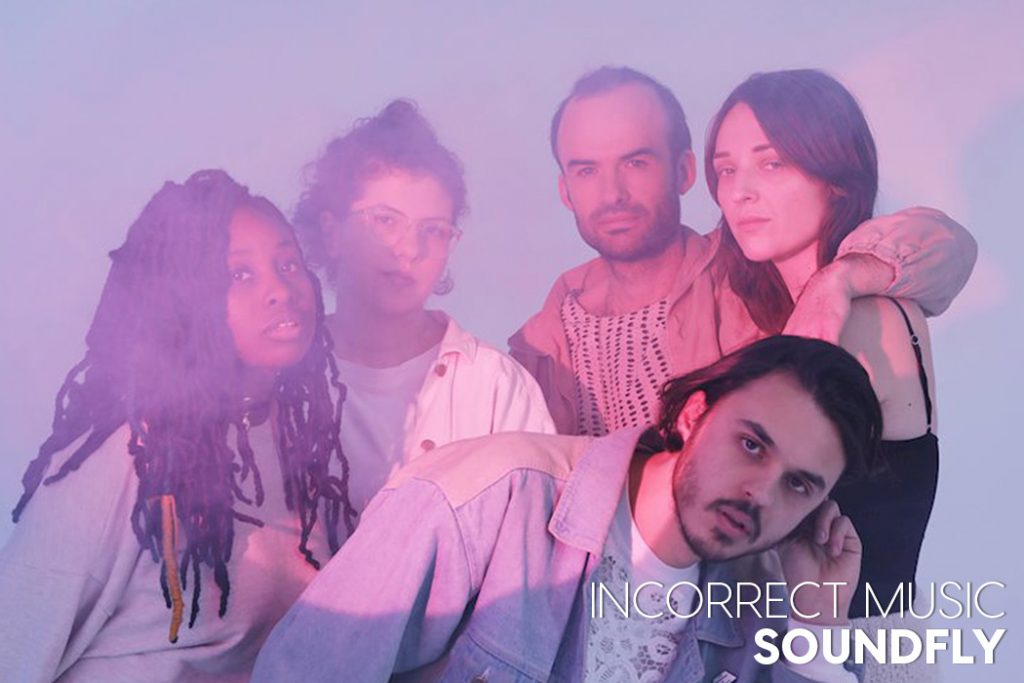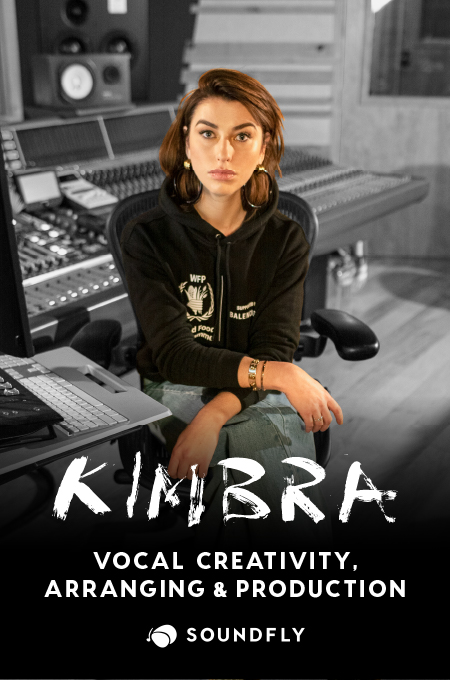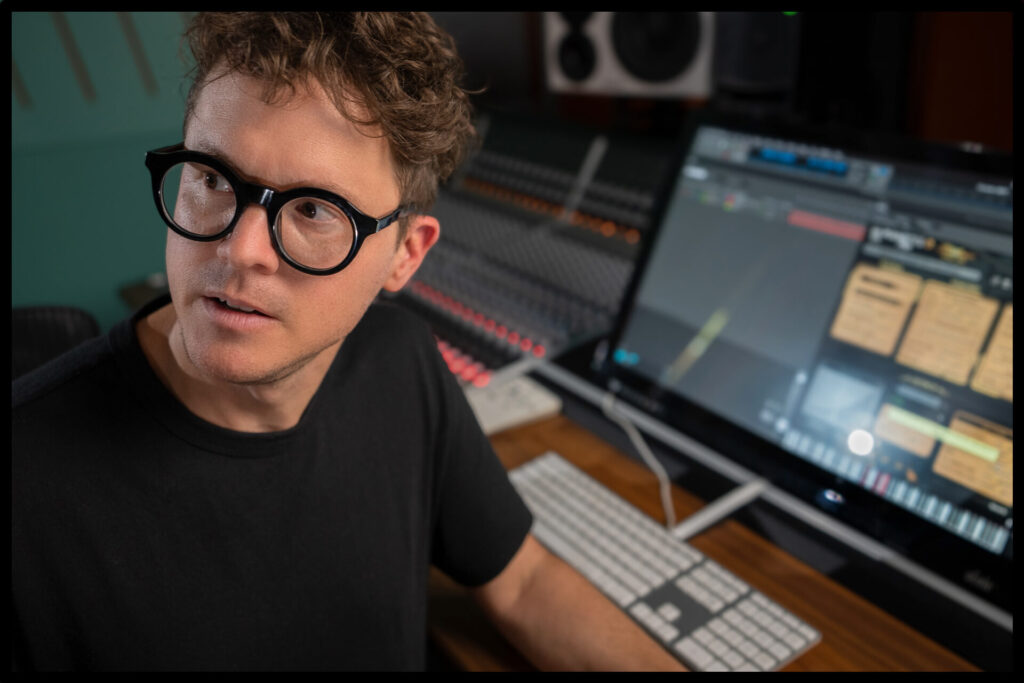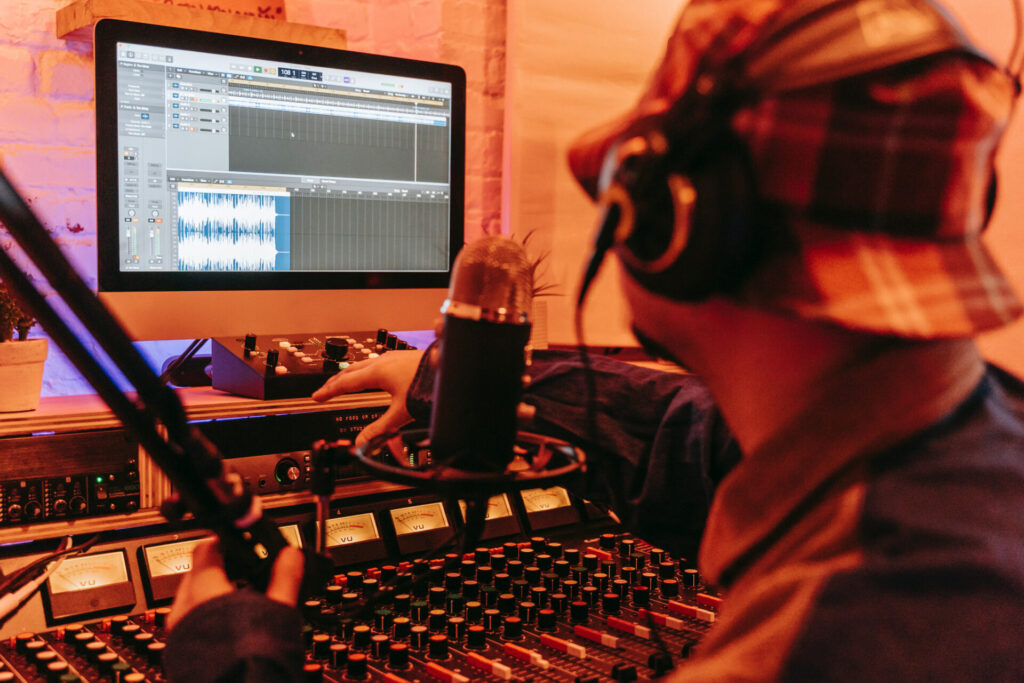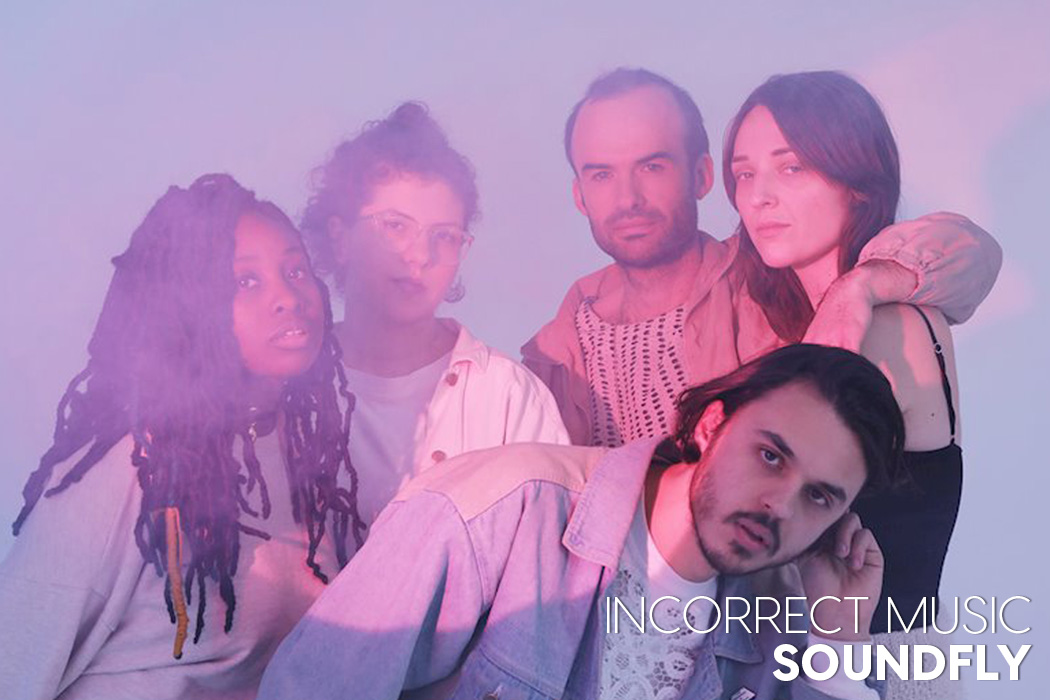
Welcome back to Soundfly’s weekly interview series, Incorrect Music, curated by guitarist, singer, and composer Lora-Faye Åshuvud (of the band Arthur Moon). In this series, we present intimate conversations with artists who are striving to push the boundaries of their process and craft.
Erica Eso composer Weston Minissali loves music that’s performed so wholeheartedly that it sounds “like it’s just short of crumbling, not necessarily because it’s sloppy, but because it’s such a momentary expression you never know what’s going to come next.” The New York-based band’s forthcoming release, 129 Dreamless GMG, is a gesture towards capturing this brand of fickle energy in the recorded medium. Microtonal synthesizer arrangements and frenetic drum performances rub against vocal deliveries that lilt and sway at the edge of restraint. Minissali calls this place “the cusp.”
I saw Erica Eso when my band split a bill with them last year and was floored by drummer Rhonda Lowry’s ability to both subvert and uplift Minissali’s compositions.
Erica Eso is music for the tense breath before release, music with the elastic potential energy of an extended spring. Their forthcoming LP, 129 Dreamless GMG, is out on March 16 via NNA Tapes and you can check them out live on tour in March to see what I mean.
– Lora-Faye Åshuvud
Interview by Patrick McGuire
Where did the title for the album come from?
It’s just a title that resonates with what I’m trying to say musically and lyrically on the album. I also wanted a name that morphed the title of our first album 2019.
The last song on the album, “House That’s Always Burning,” blends avant-garde compositional elements with conventional pop music seamlessly. How do songs like this typically come together, piece by piece?
This song began under some pretty specific circumstances. After I wrote 2019 but before I put a band together and released it, I attended a six-week silent meditation retreat. You’re not exactly supposed to, and I wouldn’t do it again now, but at that time in my life I just had to write music — in my head and on paper. I started to think about my next album and how I wanted it to flow naturally from my previous work. The chorus on “House That’s Always Burning” was actually constructed in harmony with a hook from my first record from the song “One Hundred Years.” You can hear it being sung towards the end of the song.
That was the starting point, and from there it was a matter of writing music that fit the attitude I wanted to capture. For me, composing music is always a dialogue between the general spirit I’m going for and the nuts and bolts of which notes, rhythms, instruments, and dynamics to implement. The latter is so crucial but somehow feels secondary to me.
Is there an intended connection to be made between your manic soundscapes, lyrics, and the increasingly fraught state of America?
“Intended” might not be the word I’d use, but it is certainly a result, or in dialogue with the fraught state of America. More than anything, I’m just trying to write music that feels honest and from a genuine place. And whether or not I’m successful, I’m definitely somehow reflecting the very real kleptocracy of which we find ourselves currently in the throws. But more important to me than reflecting the appearances of our society, I hope the music somehow speaks to our collective longing deep down to be whole and loving.
Can you talk a bit about your approach to lyricism in your music?
My process for writing lyrics is kind of mysterious to me. I’m not sure how it happens. And I suppose if I really thought about how I composed anything at all, I wouldn’t really be able to put a finger on it either. But the mystery of lyrics is a bit more pronounced because it’s relatively new to me.
I know that I jot down ideas in a small black notebook. They tend to be short phrases. Then usually those words either fit with a pre-existing melodic fragment, or the words themselves suggest a musical phrase, and then I expand from there. I rarely write one entirely without the other. The two elements, word and music, kind of tumble along, pick up other phrases, develop, collide, erode, build, and so forth. A lot of it has to do with having a starting point and then listening for a cue for where to guide things from there. I honestly view melodies and words as one thing.
Two of my closest friends are poets, and I’m mortified whenever I send them lyrics! Seeing them on a page, void of melody, they just lose their meaning.
What instruments and compositional techniques do you use to produce the “microtonal” elements in your music?
I don’t know how much I can say about compositional techniques. I just write what sounds right, and if I don’t know how to get what sounds right, I study and hopefully it brings me closer. As I alluded to before, a lot of my process is trying to maintain clarity of the overall feel and then employing techniques as a means to carve out that feeling.
Instrument-wise, we tune our synthesizers three ways: quarter-tone (24 notes to the octave), eighth-tone (48 notes to an octave), and normal equal temperament. Our bass player, Nathaniel Morgan, plays a fretless, so he can grab in-between notes as well.
“For me, composing music is always a dialogue between the general spirit I’m going for and the nuts and bolts of which notes, rhythms, instruments, and dynamics to implement. The latter is so crucial but somehow feels secondary to me.”
Can you describe Erica Eso’s relationship with technology? Your music seems to simultaneously embrace and shun it in really interesting ways. (By that I mean that the album has a “live” feel, but there are synthesized, ethereal passages that take you out of that space throughout.)
Ooh, that’s an interesting observation. Finding an alignment with technology that feels right is probably on a lot of people’s minds… (I just got a flip phone!)
I first came to the synthesizer as a kind of sonic explorer; I was just endlessly inspired at discovering new sounds. Since starting Erica Eso, my interests have shifted to having a more or less fixed sonic pallet that I’m committed to. Are the synthesizer, microtonality, and pop the perfect equation for my pure musical expression? No. Nor do I believe in such a thing. The synthesizer, for various reasons, just happens to be my instrument, and I’m committed to it.
A big question for me is how much computer to integrate in the compositional process. I’m not sure I want to be composing music on the same thing I write emails and read news on. But I feel somewhat addicted to demoing and figuring out ideas in software programs. It’s a work in progress. I’m still looking for that alignment.
But having a live band was always the intention. I wouldn’t have it any other way. I just love playing in a band and collaborating with other people. It’s just what I’ve always done. A big difference between this record and our last is that our drummer, Rhonda Lowry, plays on every track. She’s been a huge influence on the project all along. Recently someone came up to us after a show and said we were like a pop band with post-punk drumming. I loved that comment, because I may be “the composer” or whatever, but bringing the post-punk feel is all Rhonda. What that audience member picked up on is something really subtle, but a big part of what it means to be a band with collective and personal histories coming together.
The same goes for everyone in our band. I’m just in awe of them and feel so blessed to be working with them. Nathaniel Morgan and I have been making music intimately for eight years. He’s an absolutely incredible and uncompromising improvising alto saxophone player. Whenever one of his friends sees us play, they say, “I had no idea he played bass!” Angelica Bess and Lydia Velichkovski are the two newest members who I’m so excited to be working with. My biggest compositional goal right now is to just get to know them and try to understand what they’re inspired by, and hopefully find a way to bring that to light in Eso.
With so much of your music being written and recorded on synthesizers, are there any added challenges to performing live as Erica Eso? How much translates from your records to your live performances?
Playing microtonal keyboard parts, Lydia and I have had to relearn the keyboard. But Lydia is so talented that it hasn’t seemed to be too much of an issue for her! Since there are 24 or 48 notes to the octave, it takes two hands just to play a simple triad.
At this point we can play the songs and live arrangements well, but the degree to which we really lock in and are listening to one another and acting as one sound never stops. That’s an ambition that just keeps on going.
“The last thing Brooklyn needs is another cool, tight, clever, pretty good, homogenous indie band. We need to take risks and be on the cusp and be dreaming harder than we’ve ever dreamt.”
At Soundfly, we love to use the term “Incorrect Music” to describe the things an artist does that go against people’s assumptions, or even their own instincts, but which yield exciting and unique results. What about your music might you consider to be “incorrect”?
I think what you might be pointing towards with “Incorrect Music” is what I view as a kind of cusp. When the music feels on the very edge of something, a kind of urgency and passion is communicated. We’ve all seen an obviously very talented and practiced musician halfheartedly play their parts. That’s so boring! Much more important to me is seeing, or being, the musician who’s putting their everything into what they’re doing. Playing the compositions, but having it sound like it’s just short of crumbling — not necessarily because it’s sloppy, but because it’s such a momentary expression, you never know what’s going to come next.
Do you have any advice for young artists?
My advice to a younger artist is: don’t underestimate what music can be. There are a lot of people out there that will make you feel like writing music is cool but not important, a pastime, a hobby, a way to feel good, a way to be famous, a way to entertain, a healthy means for self-expression. All of this is completely true, but it can go far beyond all that. It really can. Making music is only a mindless privilege if you treat it that way.
After the election, I just didn’t know what to do. How can music be of service? Our country desperately needs to change its very fabric. And you can’t just change that fabric from policy making; it has to be coming from all angles of society. Music and art touch upon aspects of society that don’t always immediately show their effects, but when you see them, they’re so important. We have to commit ourselves to assisting this change in any way we can. And we’re going to fail and flounder and make mistakes and revise our intentions, but we have to stay connected to this aspect of art. What happened to artists as societies’ shamans?
The last thing Brooklyn needs is another cool, tight, clever, pretty good, homogenous indie band. We need to take risks and be on the cusp and be dreaming harder than we’ve ever dreamt.
Want to get all of Soundfly’s premium online courses for a low monthly cost?
Subscribe to get unlimited access to all of our course content, an invitation to join our members-only Slack community forum, exclusive perks from partner brands, and massive discounts on personalized mentor sessions for guided learning. Learn what you want, whenever you want, with total freedom.
